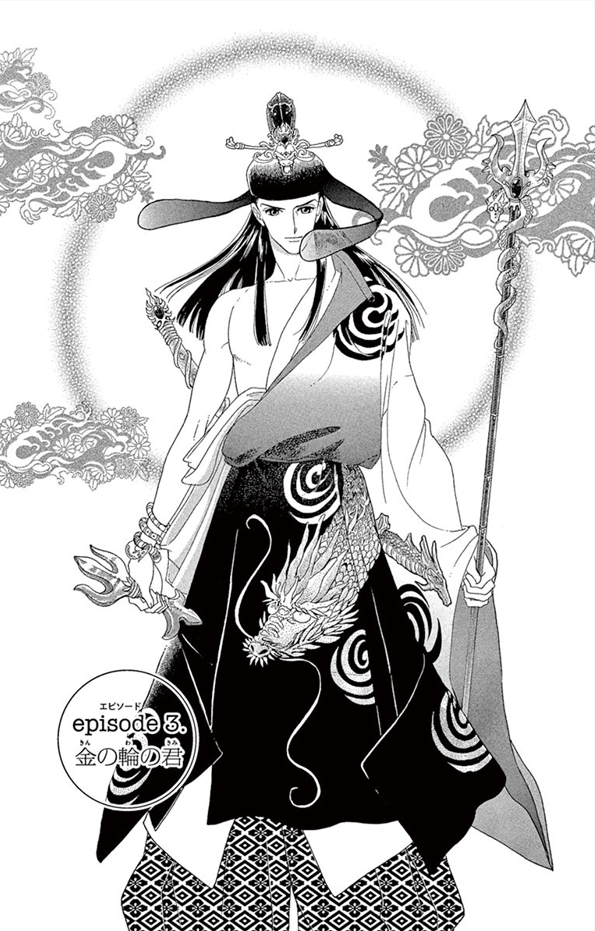Thoughts from Episode 3: The Eclipse
After Episode 2 showed Sara starting his exciting new job working for the Emperor and meeting his new best friend (whether he likes it or not) Tsuwabuki, this chapter gets a bit more dramatic. Tsuwabuki shows up uninvited at Sara’s home with two of his friends, and gets terribly upset that Sara won’t introduce him to Suiren. As it turns out, everybody has heard about Suiren, even the Emperor! This causes Sara to have (apparently for the first time in a while) a nightmare about the tengu from Episode 1. The tengu tells Sara that he and Suiren are cursed, and that the curse will be lifted when the tengu devours the Emperor.
Three important men then show up from the on’yoryo (for now at least, I have this as the Bureau of Yin and Yang – this is where they practised divination, astrology, etc) to reveal that an annular eclipse is coming, and the Emperor immediately falls ill. While everyone in the palace prepares to hide him away from the ominous effects of the eclipse, the Emperor gives his younger brother (Togu, the crown prince) a crystal ball containing an image of Kundali, one of the Five Wisdom Kings. Sara, inspired by another vision of the tengu, decides to risk being cursed by the eclipse in order to break his own curse, and is soon joined by Tsuwabuki and Togu. They go to the roof of a high building, where Togu holds out the crystal ball and prays for rain. Clouds come and obscure the eclipse, and the Emperor recovers.
Title page of Episode 3 from volume 1, page 83. ©Chiho Saito/Shogakukan
There are plenty of things to think about in this chapter! There’s new information about the tengu’s curse and how that ties into other aspects of the story, as well as plenty of details about the belief system at the court. Today, though, I’ll just take a look at the chapter’s title – which is quite enough to handle!
Episode 3 is titled 「金の輪の君」 (kin no wa no kimi). This is quite a bit more abstract than previous titles, which were just characters’ names. The meaning of “kin no wa” becomes clear when characters begin talking about the eclipse. The astrologers talk about a 金の環の日食 (kin no wa no nisshoku), referring to the annular eclipse. Usually this is written without the のs, as 金環日食 (kinkan nisshoku), but it’s same in practice, qualifying the eclipse (nisshoku) as one where a golden ring (kin no wa) is visible.
You might notice – not that I did at first! – that the spelling in the dialogue uses the kanji 環 where the title uses 輪. I was trying to figure out what difference this would make and why it would be worth writing it two ways, but I think it’s most likely for practical reasons. In the title, it’s standing alone, and as 輪 is more commonly used for “ring” as a noun, it makes a bit more sense in that context. On the other hand, when it appears again later, it’s in the full “annular eclipse” phrase. It uses the same words, and with the same meaning, but “kinkan nisshoku”, the usual term for an annular eclipse, uses the more abstract 環 and can’t be written with a 輪. Perhaps there is more to it, but that’s the only reason I can see for writing it two different ways.
Another side point here is about the word for eclipse itself: 日食, meaning that the sun is eaten. There are old Chinese myths about monsters eating the sun during an eclipse, including a black dog called the tiangou. This is written as 天狗, the same spelling as “tengu”, which in Japan came to be seen as birdlike monsters such as the ones we see pretty regularly in Torikae baya. So when the dream-tengu tells Sara it’s going to devour the Emperor – whom the people at the court handily point out is symbolised by the sun – it connects closely with old myths about eclipses.
Anyway, what about that title? How should it be translated? As we have the “kin no wa” but not the “nisshoku”, it doesn’t really seem right to translate this as “eclipse”. That would be providing information that the Japanese readers aren’t getting at this point. “Annulus” could make sense as that’s the part that is mentioned, but the fact it’s written as 金の輪 and not 金環 puts me off that too. And there’s a later line that makes me feel that it could be intended to evoke the idea of a halo as well, which then gels with the imagery of the title page. This all makes me lean towards a fairly literal answer, so that I’m not saying more than I should, and so that it remains mysterious. In the end, I came up with “He of the Golden Ring” – interpreting the “kimi” in the same way as it gets used as a term of respect in people’s (usually men’s) names.
I’m just glad not every translation choice is as complicated as this!

